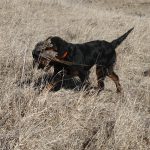Pointing Dog Pointers: Let’s Talk Trainers
By Bob and Jody Iler
Spring – it’s the time of year where pointing dog owners start thinking about training! Maybe you’ve welcomed a new puppy later last year and would like to have pup ready to hunt in the upcoming fall season. Or maybe you’ve gotten a new pup this spring and are hoping to hunt with your buddy by this autumn. Perhaps you have a pointing dog that’s a couple years old and you’ve not tapped in yet to see if he has hunting potential.
Whatever the scenario, if you’ve decided to enlist the help of a professional trainer, we’d like to offer some “pointers” for you to help in making your decision.
Most trainers won’t take a pup that’s under six months of age; these pups are just babies. If you have a 2021 spring puppy, have lots of fun with him and teach him the basics of collar, lead, and long line and simple commands such as come. If you have a trainer lined up for when your pup is old enough, you may want to ask the trainer’s advice on what things he would like you to do – or not do – right now. For example, you’ll be paying him later to get your pup into birds and to develop your pup to the gun, so he may not want you to start attempting these things on your own. The pup that’s ready to go to the trainer now should be acclimated to a lot of different things – environment, situations, other people and dogs – to make the transition to a training kennel easier. And the one- or two-year old pointing dog pup (yes, they are still pups) will likely be evaluated by the trainer before a training program is begun.
So, what should you look for in a trainer?
Experience
How long has the trainer been in business? If he or she has been in business for a good length of time, chances are that they have been successful at it. Don’t discount a trainer who hasn’t been training for too long – give him a chance to share his program with you and to offer references. Ask to watch him training in the field before you commit. Ask about his training methods and philosophy. You don’t want your pup to be a “guinea pig” for a new trainer’s errors either.
Honesty
Not all pups are necessarily going to make good hunters. Genetics play a major role in a pup’s ability as he matures. Other factors – such as pup’s premature exposure to birds and guns, or other negative training experiences before going to the trainer – can affect a pup’s future performance. The trainer should be able to give you a good evaluation after the first month if there are problems. He may take you out in the field so that you can see the dog work in order to understand what is happening. If the dog hasn’t got what it takes, a good trainer will share this with you, after a fair evaluation period.
Location
A good trainer will expect you to come and see your dog’s progress at designated intervals during the training process. If the kennel is not too far away, this will be easier for you to do, but regardless of the distance, you should plan on regular visits and receive training reports. Beware of the trainer who doesn’t want to see you for the duration!
Some trainers may offer classes where you can come with your dog on a regular basis, such as weekly, and work with the trainer. Usually this type of program would last for a minimum of eight weeks. If the location is not too far from your home, this is often a good alternative to leaving your dog at a training kennel. This method teaches the owner as well as the dog and is a successful way to develop your pointing dog pup.
Facilities
It’s important for you to visit the training kennel and see the facilities where your dog will live and the areas where training will be done. The trainees should look healthy and happy, and have clean fresh water available with appropriate shade, heat, and shelter. The facility should be clean and in good repair. You can’t always go by an ad in a magazine or online. It’s important to visit the facility yourself! Check out the areas used for training and what birds the trainer uses for his program. Pigeons are good but quail should also be used.
Specialties
Whether a trainer enjoys developing hunting dogs or prefers to work with hunt test and field trial dogs – or both – be sure that he understands what you as a client want him to do with your dog. If a trainer specializes in trial dogs, this may not be the trainer for you if you want a great gun dog. Not that these are mutually exclusive at all, but the methods used to develop trial dogs will often be different from those used for hunting dogs.
Training Methods/Philosophy
Here, when we talk about training methods, we’re referring to light- or heavy-handed trainers. There are trainers who may start your pup right off the bat wearing an e-collar. Our personal belief is that the e-collar has no place in early development of a started dog. Some trainers use force unnecessarily. Other trainers believe in letting a pup develop without undue pressure, allowing all the joy and wonder of learning to love birds to come out.
The trainer should never promise that a pup will be doing certain things within a specified amount of time. All pups are different, like children. They need to be evaluated and developed according to their traits and abilities, and always with kindness and a gentle hand. Look at the dogs in the training kennel. Are they excited to see the trainer and eager for him to take them out? Or do they show uncertainty when they see him, even cower? That red flag should have you looking elsewhere!
We have always promised our clients that their pups will go home as happy as when they came in to our kennel. This is the one guarantee you should require from a trainer!
Time Commitment
Good dog training takes time. An average training program will take several months, minimum. Again, beware of kennels that make time guarantees – for example, “Your dog will be gun broke and steady to wing and shot in 90 days!” When it comes to developing pups, it should take as long as it takes. Having said that, beware of trainers who keep your pup for months; often these dogs are just sitting in a kennel and not getting worked at all. If a trainer has another full-time job, this could be a red flag if he has too many dogs in his kennel. Will they be trained or just boarded? Hence your regular visits to note your dog’s progress!
Cost
Depending on the trainer’s specialty and experience, training can run from hundreds of dollars monthly to $1,000 or more, depending on where you live. Check around for prices in your neck of the woods to compare. More important than price are all the factors we’ve discussed already. You have only this one lovely bird dog and you want him developed properly. Confidence in your trainer is more important than price.
References
Take the time to ask the trainer for references of former clients and check them out. The best advertising for a successful training kennel is a happy clientele who are eager to share their good experiences with you.
Future Availability of the Trainer
When you take your pup home, will you still have a relationship with your trainer? A good trainer will educate you both during and after your pup’s training program. He’ll be available for questions you may have down the road and is happy to help you through a developing issue or situation that arises. A good trainer will often take your dog back for a few weeks or a month to remedy or fine tune a problem.
These tips should help you find a trainer who will develop your special pup to the best of his abilities! Good luck!
Pointing Dog Pointers features monthly training tips by Bob and Jody Iler, who own Green Valley Kennels in Dubuque, Iowa. Bob and Jody have trained pointing dogs for over 35 years and have written many articles for The Pointing Dog Journal.









